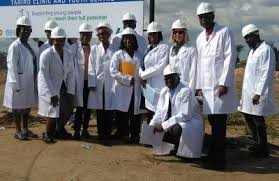By Byron Mutingwende
In sync with strengthening partnership for sustainable development, the City of Harare came together with the International Labour Organisation (ILO) and the United Nations Population Fund (UNFPA) and have embarked on an infrastructure project in Hopley to improve access to sexual and reproductive health services by young people.
Speaking during the launch of the construction of a youth centre and a clinic at Hopley in Harare South, Serge Bounda, the UNFPA Representative to the African Union (AU) said the project was part of the continental body’s roadmap to harnessing demographic dividends for investments among the youths.
“The project here has already impacted positively on young people because they are the ones employed to work as plumbers, bricklayers, electricians and carpenters. In future when the youth centre and clinic are complete, they will have access to youth-friendly services and health,” Bounda said.
His counterpart, Cheikh Tidiane Cisse weighed in by underscoring the importance of having in place programmes on adolescent and youth development in the communities.
“Giving the youths skills to occupy themselves will give them an opportunity to protect them. Those youths that have been given skills in carpentry, building and other disciplines won’t engage in vices like drug abuse, thereby promoting healthy lives,” Cisse said.
Prosper Chonzi, the Director of Health Services in the City of Harare said that Hopley is a peri-urban district located on the outskirts of Harare with a population of about 200 000 people.
“It is characterised by high levels of migration, poor infrastructure, and low education and employment rates. These challenges are evidenced by the poor development outcomes for young people. We initially converted a makeshift old farmhouse into a satellite clinic to cater for the people who settled there after housing demolitions. That clinic was not user friendly since the area has poor water, sanitation and hygiene. We then felt the need for a proper health facility and approached UNFPA and ILO who came with financial assistance of $400 000 and as the city of Harare we managed to raise $100 000 to build the structure up to slab level,” Chonzi said.
Hopolang Phororo, the Director, ILO Country Office for Zimbabwe and Namibia said that her organisation seeks to address poverty, social injustice and inequality among the youths hence their decision to identify local-based under-priviledged youth who were trained in various technical skills to work during the construction of the project.
“Through this collaboration, Harare South is being used as a pilot of how investment in social infrastructure (clinics, schools, roads etc.), can build skills for employment and create jobs for young people,” Phororo said.
Dagmar Hanisch, the UNFPA Zimbabwe Technical Specialist on HIV and Sexual Reproductive Health expressed concern over high cases of teenage pregnancy in the area, which stood at 21% while 70% of the women became mothers by the age of 24 years. She said that child marriages were at 18% while secondary school drop-outs were at 13% with young people aged between 10-24 years were estimated to be 65 000.
“We expect the initiative to showcase the delivery of integrated health services that increase access to and use of sexual and reproductive health services among young people in particularly disadvantaged contexts throughout Zimbabwe. The ultimate goal of the joint programme is to support young people to lead healthy, productive lives through; reducing unwanted pregnancies, early marriages, incidences of HIV, school dropouts and creating employment opportunities,” Hanisch said.
For the Hopley project, vulnerable young people, with a focus on young women, were identified for a skills training programme in partnership with St. Peters’ Kubatana Vocational Training Centre. The young people received skills to help address the challenges in Hopley. 50 young people were trained in brick and block laying, carpentry, joinery, plumbing and electrical. An additional 50 young people received training in cobblestone technology – a low cost employment intensive approach to the provision of access roads. Using locally available materials, the young people will work on the construction of access road linking the clinic to the Chitungwiza Road.
Two of the recipients, Dadirai Kaopa and Moleen Mariga said the skills training had extricated them out of poverty since they will use the skills to look after themselves even after the completion of the construction project.
“In the past, I would spend the entire day loitering in the streets but with the training, I am now an expert in unblocking drainages and plumbing. I am also grateful for the clothes and food we are given at work. It is my hope that I will be able to offer my services in exchange for money to feed my children and send them to school,” Mariga said.
It also emerged that the multi-purpose youth centre, as a community amenity, will provide a safe space for young people to meet and will offer various youth development programmes.
